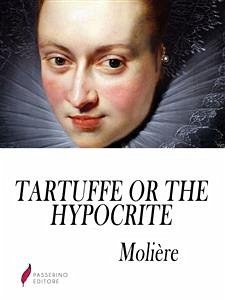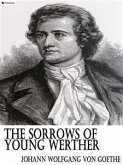Tartuffe, or The Hypocrite, first performed in 1664, is one of the most famous theatrical comedies by Molière. The characters of Tartuffe, Elmire, and Orgon are considered among the greatest classical theatre roles.
Jean Baptiste Poquelin, better known by his stage name of Moliere, stands without a rival at the head of French comedy. Born at Paris in January, 1622, where his father held a position in the royal household, he was educated at the Jesuit College de Clermont, and for some time studied law, which he soon abandoned for the stage. His life was spent in Paris and in the provinces, acting, directing performances, managing theaters, and writing plays. He had his share of applause from the king and from the public; but the satire in his comedies made him many enemies, and he was the object of the most venomous attacks and the most impossible slanders. Nor did he find much solace at home; for he married unfortunately, and the unhappiness that followed increased the bitterness that public hostility had brought into his life. On February 17, 1673, while acting in "La Malade Imaginaire," the last of his masterpieces, he was seized with illness and died a few hours later.
The first of the greater works of Moliere was "Les Precieuses Ridicules," produced in 1659. In this brilliant piece Moliere lifted French comedy to a new level and gave it a new purpose—the satirizing of contemporary manners and affectations by frank portrayal and criticism. In the great plays that followed, "The School for Husbands" and "The School for Wives," "The Misanthrope" and "The Hypocrite" (Tartuffe), "The Miser" and "The Hypochondriac," "The Learned Ladies," "The Doctor in Spite of Himself," "The Citizen Turned Gentleman," and many others, he exposed mercilessly one after another the vices and foibles of the day.
His characteristic qualities are nowhere better exhibited than in "Tartuffe." Compared with such characterization as Shakespeare's, Moliere's method of portraying life may seem to be lacking in complexity; but it is precisely the simplicity with which creations like Tartuffe embody the weakness or vice they represent that has given them their place as universally recognized types of human nature.
Translated By Curtis Hidden Page.
Jean Baptiste Poquelin, better known by his stage name of Moliere, stands without a rival at the head of French comedy. Born at Paris in January, 1622, where his father held a position in the royal household, he was educated at the Jesuit College de Clermont, and for some time studied law, which he soon abandoned for the stage. His life was spent in Paris and in the provinces, acting, directing performances, managing theaters, and writing plays. He had his share of applause from the king and from the public; but the satire in his comedies made him many enemies, and he was the object of the most venomous attacks and the most impossible slanders. Nor did he find much solace at home; for he married unfortunately, and the unhappiness that followed increased the bitterness that public hostility had brought into his life. On February 17, 1673, while acting in "La Malade Imaginaire," the last of his masterpieces, he was seized with illness and died a few hours later.
The first of the greater works of Moliere was "Les Precieuses Ridicules," produced in 1659. In this brilliant piece Moliere lifted French comedy to a new level and gave it a new purpose—the satirizing of contemporary manners and affectations by frank portrayal and criticism. In the great plays that followed, "The School for Husbands" and "The School for Wives," "The Misanthrope" and "The Hypocrite" (Tartuffe), "The Miser" and "The Hypochondriac," "The Learned Ladies," "The Doctor in Spite of Himself," "The Citizen Turned Gentleman," and many others, he exposed mercilessly one after another the vices and foibles of the day.
His characteristic qualities are nowhere better exhibited than in "Tartuffe." Compared with such characterization as Shakespeare's, Moliere's method of portraying life may seem to be lacking in complexity; but it is precisely the simplicity with which creations like Tartuffe embody the weakness or vice they represent that has given them their place as universally recognized types of human nature.
Translated By Curtis Hidden Page.









